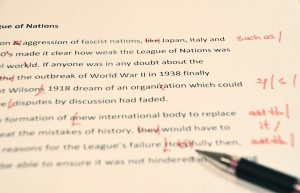If you think that editing is not your problem my writing friend, you are sorely mistaken. The job of editing a manuscript is one shared by writer and editor, not just an editor. It lacks professionalism and screams of laziness when you neglect fundamental writing practices in the belief that someone else will fix whatever mess you’ve left. Do you think best-selling authors submit a manuscript without having run a spellcheck or appropriate formatting? Hell no. A publisher wouldn’t stand for it.
As an independent editor, I’m more forgiving of this than editors within publishing houses. Why? It means more money for me. The more time I spend formatting, getting rid of redundancies and fixing their/there/they’re, the more I get to charge you. Do you want that? Because I will take your hard-earned money. Fixing basic issues can add many hours to the end price of your edit.
You can protect your wallet by employing solid self-editing techniques, and as a personal aside, I love seeing a manuscript that has been well self-edited. More than anything. It shows me that I’m dealing with someone who really cares about their work, and you know what? My editing rates are pretty damn good when I can see that an author has made an effort. I’m not going to charge you for something I don’t need to touch!
Publishers feel the same way. They’re more likely to take on your manuscript if you’ve been through it with exacting precision. As a writer, your head should be wrapped around your words, but if you look at the publishing process upstream, someone will be watching the budget. No one has an infinite amount to spend on developing a book that won’t make it back in sales. Sad truth.
You, my writing friend, have a better shot of publishing with a strong manuscript. Here’s a common query for you. Does self-editing replace the need for an external editor?
No.
Know this. Your manuscript will be judged, criticised, reviewed, trolled, dismissed and/or ignored. I don’t want to freak you out, but you’re better off understanding that upfront. People are horrible. They’re opinionated, judgemental, rude and elitist. BUT. They’re also warm, supportive and will embrace a book they love. They provide your best source of marketing when they tell someone else that they love your book. If you give them a story full of plot holes, poor narrative construction, inaccuracies and typos, what are they going to think? What will they say about your book?
Don’t give the reader an opportunity to criticise you for things that could have been avoided, especially if you’re independently publishing. Hiring a professional editor will lead to a better reception of your work, and I absolutely recommend it 100%, but we all know that editing can be expensive. I know this. I’m an editor and I can tell you that it’s a labour intensive job. An 80,000 word manuscript does not get edited in one sitting!
Luckily, there are inexpensive measures you can take prior to engaging an editor, self-editing tips that will help you improve your manuscript. If you go searching the interwebs you’ll find lots of information on self-editing, and most of it works but it’s all jumbled together. You’ll often find language self-editing tips mixed up with structure self-editing tips. That can make things seem confusing.
I believe that self-editing can be divided into 5 clear stages. We’re going to look at these stages in depth over the coming articles.
- Mindset – getting your head right
- Structure – getting the story right
- Language – getting the words right
- Admin – getting the file right
- Feedback – getting your product right
To self-edit with effect, you need to be organised and very clear on what gives a manuscript its quality. You need to see your manuscript as a reader might, and be open to the fact that you have probably missed something. You must look at your story as though it was written by a stranger and be prepared to wound yourself, if necessary, to ensure that your manuscript is the absolute best it can be. No stage in this process is interchangeable. No stage in this process comes without hard work. But that’s the deal in being a writer, isn’t it?
Keep your eyes peeled for articles on each self-editing stage, and remember, while self-editing is an effective manuscript preparation tool, it’s always best to have at least one impartial editorial eye go over your manuscript. A good self-edit will ensure a reasonably priced professional edit down the track.
Write on!
